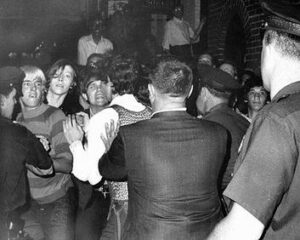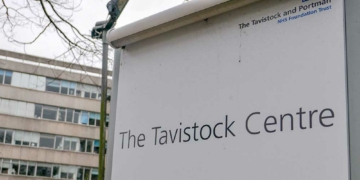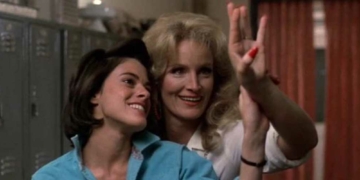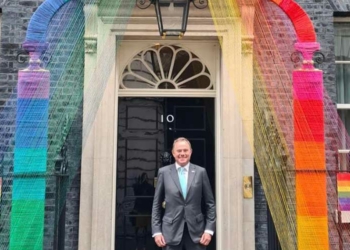In the last week, Professor Kathleen Stock has been the victim of a campaign of harassment, to the horror of feminists, gay rights advocates, and free speech proponents. Whilst Stock has stood firm, and had a great amount of support, these recent incidents are unfortunately the latest in a number of attacks on women and feminists who dare speak out against gender ideology. Kathleen Stock unfortunately joins a list of women, including such prominent voices as Julie Bindel, Milli Hill, JK Rowling, and Allison Bailey, who have all faced harassment, violent threats and even physical assault for their views. Such attacks should not be happening in a society that prides itself on democracy, and yet they continue, both because not enough is done to clamp down on violence, especially violence against women, but also because people remain ignorant to the danger the groups behind these campaigns pose.
The recent campaign against Kathleen Stock was orchestrated by a group that describes itself as a ‘network of queer and trans students’ that is ‘committed to showing unity and resistance in the face of sussex uni’s employment of Kathleen Stock’. It has few followers across its social media, but this in itself is no reason to be dismissive of their action. Carried out anonymously, with even photos edited to hide the faces of those involved, it is this group that has targeted the campus where Kathleen Stock works – has put up posters, hung signs, and set off flares in an attempt to create a climate of fear. It published a manifesto of sorts in addition, describing Professor Stock as ‘one of this wretched island’s most prominent transphobes’ and ending with the note ‘fire Kathleen Stock. Until then, you’ll see us around’. There are few other ways to read this than as a direct threat.
But whilst action may have been by a single group, they have received support from other activist groups in and around Brighton. The most prominent describes itself as a ‘queer affinity group for radical pride actions’ and supports this through actions such as calling for ‘no pigs at pride’ and campaigns to ‘reclaim pride’ through posters of Molotov cocktails. This group has stood unquestionably behind the harassment of Professor Stock, and has encouraged the harassment of other prominent women before, including Rosie Duffield and Jess Phillips.
Queer activist groups are attempting to model themselves after a history that doesn’t exist, not in America, but also especially not in Britain.
But who benefits from these campaigns of harassment? Who do these groups actually represent? It hasn’t escaped notice that Professor Stock, a lesbian, is being threatened here by groups claiming to be ‘queer’ activist groups. But then, these groups draw clear lines between being gay and being ‘queer’ with one of them tweeting, ‘Brighton is for the Queer. Not only for the gay. For the Queer’. But who even are ‘the queer’? The group provides a list of the people they represent, including ‘black queer lives’, ‘neurodivergent queer lives’ and ‘queer disabled lives’, but again, no definition of who the ‘queer’ might be. They list other groups they claim to represent too, such as ‘gender nonconforming lives’ and ‘incarcerated trans lives’. So whilst they don’t claim to represent lesbian women like Kathleen Stock (despite her and many lesbians arguably fitting their ‘gender nonconforming’ label), as a group they do claim to represent trans prisoners, a category that includes individuals such as Karen White, who sexually assaulted two women whilst placed in a women’s prison in 2018. They have invented here a view of what ‘marginalised’ communities look like, one based on their imaginations, not reality.

The Stonewall Riots on 28th June 1969
What I find striking, looking at the individuals and groups responsible for much of the harassment directed towards women such as Kathleen Stock, is how far the activism of these groups feels like role play. Role play specifically of a fictionalised version of the 1960s American gay rights movement. These groups want to be the next Stonewall Rioters, in a version of the riots reimagined by today’s woke crowds. They view the Stonewall Riots of 1969 as the riots of a collective ‘queer’ community, action led by black, trans, ‘happy’ sex workers on behalf of the marginalised, and they desperately want to be these activists. They want to be part of Pride when Pride truly was a protest. They want to be the ones to create their local ‘queer’ community – supporting those in need whilst fighting ‘oppression’.
Why though? Well, perhaps because the gay rights movement today feels too easy. Perhaps because the big moves have already been made, the laws already changed and acceptance being the social norm. Perhaps because far too much identity, especially ‘queer’ identity, is fixed around the idea of oppression and so oppression must be sought out even where it does not exist. Perhaps also because they don’t know their history. That the Stonewall Riots were started by a lesbian, and gay pride marches started by two gay men. That Marsha P Johnson was a gay man and, far from being a happily chosen ‘queer’ hub, the Stonewall Inn was frequented by those often with nowhere else to go.
Queer activist groups are attempting to model themselves after a history that doesn’t exist, not in America, but also especially not in Britain. Whilst the fight for gay rights was fought by gay men and lesbians, there has never been a united ‘LGBT’ or ‘queer’ community in Britain, and to hark after one is nonsensical. It’s as nonsensical as focusing an entire activist group around representing communities that can’t be defined, as is the case with the ‘queer’ community, whilst ignoring the reality of same-sex attraction and the homophobia gay people face.
And this is what the actions of these ‘queer activists’ comes down to. Pure performance. The adoption of an identity rooted in a fictionalised history, and focused solely on the enforcement of this through the creation of a culture of fear and silencing.
It’s absurd as well to suggest that, even if ‘queer’ activism was needed, it would be needed at all in Brighton, where Kathleen Stock has faced harassment, which has been known as the gay hub of Britain for far longer than any of these ‘queer’ activists have been alive. Even the targeting of Professor Stock has its roots in performance activism, as any real engagement in her work shows her commitment to the protection of trans people’s lives and the respect she shows to trans individuals. As she states in her recent book Material Girls, ‘They (trans people) deserve to be safe, to be visible throughout society without shame and stigma, and to have exactly the life opportunities non-trans people do’. Kathleen Stock is no transphobe, nor any sort of representation of hatred, but a feminist who cares deeply about protecting women’s rights and trans lives. And so the targeting of her cannot be put down to fears of safety, but performance activism.
And this is what the actions of these ‘queer activists’ comes down to. Pure performance. The adoption of an identity rooted in a fictionalised history, and focused solely on the enforcement of this through the creation of a culture of fear and silencing. That is not to dismiss the threat it still poses. The threats and harassment directed towards women such as Professor Stock must be taken seriously, as those responsible certainly do. Women should not be living in fear for simply voicing opinions on an ideology that harms us all. But we must also do more to show this ‘activism’ for what it truly is. Egotistical cosplay at its finest.
Kat Howard is a lesbian radical feminist, working as a writer and secondary school teacher.
Kat Howard tweets at @RadFem_KatH
























I can't believe that this 'network' of thugs have read Kathleen Stock's 'Material Girls' but in the unlikely event that even some of them have, they certainly haven't understood it. Or any of her beautifully clear writings. I love that book and go back to it often.